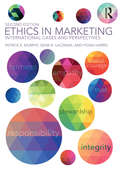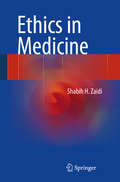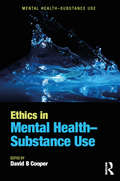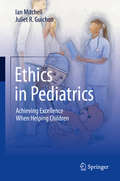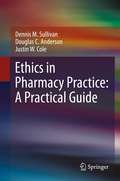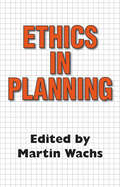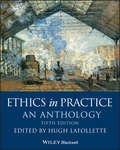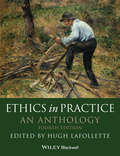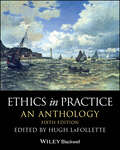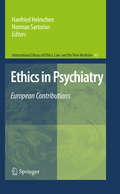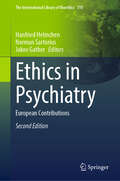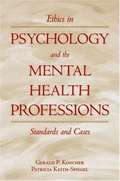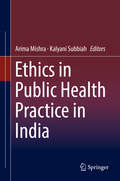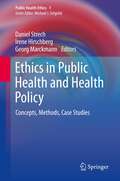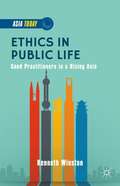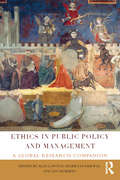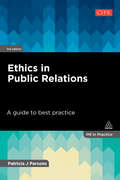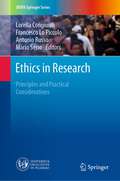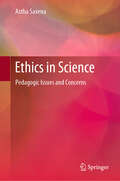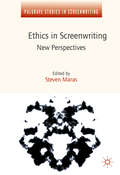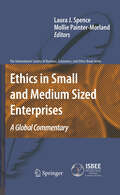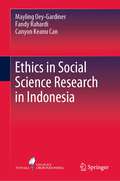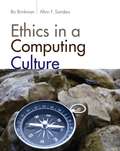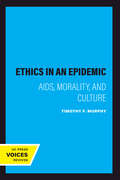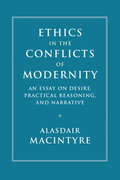- Table View
- List View
Ethics in Marketing: International cases and perspectives
by Patrick E. Murphy Gene R. Laczniak Fiona HarrisUnderstanding and appreciating the ethical dilemmas associated with business is an important dimension of marketing strategy. Increasingly, matters of corporate social responsibility are part of marketing's domain. Ethics in Marketing contains 20 cases that deal with a variety of ethical issues such as questionable selling practices, exploitative advertising, counterfeiting, product safety, apparent bribery and channel conflict that companies face across the world. A hallmark of this book is its international dimension along with high-profile case studies that represent situations in European, North American, Chinese, Indian and South American companies. Well known multinationals like Coca Cola, Facebook, VISA and Zara are featured. This second edition of Ethics in Marketing has been thoroughly updated and includes new international cases from globally recognized organizations on gift giving, sustainability, retail practices, multiculturalism, sweat shop labor and sports sponsorship. This unique case-book provides students with a global perspective on ethics in marketing and can be used in a free standing course on marketing ethics or marketing and society or it can be used as a supplement for other marketing classes.
Ethics in Medicine
by Shabih H. ZaidiThis book both presents a succinct history of medical ethics and discusses a wide range of important ethical dilemmas in the provision of modern health care. A synopsis is provided of ethics through the ages and the role of ethics in the evolution of medicine. Principles and sources of medical ethics, as well as different religious and secular perspectives, are explained. Ethical concerns in relation to a variety of specific issues are then examined. These issues include, for example, human experimentation, stem cell research, assisted reproductive technologies, termination of pregnancy, rationing of health care, euthanasia, and quality of life issues. The author's many years of practicing medicine in different cultures and countries and his passion for theology works, philosophy, literature, poetry, history, and anthropology have informed and enriched the contents of this stimulating book.
Ethics in Mental Health-Substance Use (Mental Health–Substance Use)
by David B CooperEthics in Mental Health-Substance Use aims to explore the comprehensive concerns and dilemmas occurring from mental health and substance use problems, and to inform, develop, and educate by sharing and pooling knowledge, and enhancing expertise, in this fast developing region of ethics and ethical care and practice. This volume concentrates on ethical concerns, dilemmas, and concepts specifically interrelated, as a collation of problem(s) that directly or indirectly affect the life of the individual and family. Whilst presenting a balanced view of what is ethically best practice today, this title challenges concepts and stimulates debate, exploring all aspects of the development in treatment, intervention and care responses, and the adoption of research-led best practice.
Ethics in Pediatrics: Achieving Excellence When Helping Children
by Ian Mitchell Juliet R. GuichonThis book offers easy access to the everyday ethics problems that occur in the medical care of children. It contains practical guidance on how physicians and other healthcare practitioners may manage both straightforward and complex ethics problems. The book provides a readable and comprehensive introduction to ethics issues for beginners and is also extremely valuable to experienced practitioners.This work covers important "classical" ethical issues such as privacy, confidentiality, truth telling, and discusses the elements of the relationships that might exist between parents and healthcare providers. However, the book also provides a resource for new and emerging areas of bioethics. These include issues arising in the new population of children who are beginning to survive the neonatal and infant periods with a multitude of problems – “children with medical complexity". Finally, it also includes a section on the advantages and pitfalls of social media use.
Ethics in Pharmacy Practice: A Practical Guide
by Dennis M. Sullivan Douglas C. Anderson Justin W. ColeThis textbook offers a unique and accessible approach to ethical decision-making for practicing pharmacists and student pharmacists. Unlike other texts, it gives clear guidance based on the fundamental principles of moral philosophy, explaining them in simple language and illustrating them with abundant clinical examples and case studies. The strength of this text is in its emphasis on normative ethics and critical thinking, and that there is truly a best answer in the vast majority of cases, no matter how complex. The authors place high trust in a pharmacist’s moral judgment. This teaches the reader how to think, based on ethical principles, not necessarily what to think. This means navigating between the two extremes of overly theoretical and excessively prescriptive. The cogent framework given in this text uses the language of competing duties, identifying the moral principles at stake that create duties for the pharmacist. This is the balancing act of normative ethics, and of deciding which duties should prevail in a given clinical situation. This work presents a clear-cut pathway for resolving ethical dilemmas encountered by pharmacists, based on foundational principles and critical thinking.Presents a clear-cut pathway for resolving the ethical dilemmas encountered by pharmacists, based on foundational principles and critical thinking.Jon E. Sprague, RPh, PhD, Director of Science and Research for the Ohio Attorney General
Ethics in Planning
by Martin WachsSome planners limit discussions of ethics to simple, though important, questions about the propriety of their daily activities. This approach to ethics restricts discussion of professional ethics to the propriety of everyday social and professional relationships. It ignores the broader ethical content of planning practice, methods, and policies. While narrow definitions of ethical behavior can easily preoccupy public officials and professional associations, they divert attention from more profound moral issues.Martin Wachs argues that ethical issues are implicit in nearly all planning decisions. For illustrative and educational reasons, it is useful to divide ethics in planning into four distinct categories. The first category includes the moral implications of bureaucratic practices and rules of behavior regarding clients and supervisors. The second category includes ethical judgments which planners make in exercising their "administrative discretion." More complex, and represented by a third category, are the moral implications of methods and the ethical content of criteria built into planning techniques and models. The final type represents the basic choices which society makes - those inherent in the consideration of major policy alternatives.Ethics in Planning contains a variety of representative papers to capture the current state of thinking. This book will be important as a text for survey classes in professional ethics given by university planning programs. It should also supplement short courses in planning ethics for practicing professionals and provide source materials for discussions of planning ethics sponsored by local chapters of the American Planning Association and similar organizations. It gathers together exemplary and critical works, thus it will also interest individual planners in a field that only continues to grow in recognition and importance.
Ethics in Practice: An Anthology (Blackwell Philosophy Anthologies)
by Hugh LaFolletteThe bestselling and field-defining textbook which has introduced generations of students to the field of practical ethics, now in a new fully-revised fifth edition For more than twenty years, Ethics in Practice has paved the way for students to confront the difficult ethical questions they will, must, or do already face. Accessible to introductory students yet sufficiently rigorous for those pursuing advanced study, this celebrated collection encourages and guides readers to explore ethical dimensions of important, controversial topics such as euthanasia, environmental action, economic injustice, discrimination, incarceration, abortion, and torture. In combining new and revised modern texts with works of classic scholarship, Ethics in Practice equips readers to consider wide-ranging ideas in practical ethics and to understand the historical basis for contemporary developments in ethical theory. Revisions and updates to the new edition of Ethics in Practice focus on covering pressing global issues and adding depth to key sections. Many sections have been expanded to offer more thorough coverage of topics in ethical theory. Edited by Hugh LaFollette, highly regarded for his contributions in the field of practical ethics, this important volume: Explores the connections between ethical theory and divisive contemporary debates Includes general and section introductions which map the conceptual terrain, making it easy for students to understand and discuss the theoretical and practical dimensions of the issues Offers up-to-date incisive discussion global, local, and personal ethical issues Provides original essays, new perspectives, and revisions of key critical texts Enables instructors to discuss specific practical issues, broader groupings of topics, and common themes that connect major areas in ethics Already a market-leading text for introductory and applied ethics courses, the latest edition of Ethics in Practice: An Anthology continues to bean essential resource for instructors and students in philosophy departments around the world.
Ethics in Practice: An Anthology (Blackwell Philosophy Anthologies)
by Hugh LaFolletteThe fourth edition of Ethics in Practice offers an impressive collection of 70 new, revised, and classic essays covering 13 key ethical issues. Essays integrate ethical theory and the discussion of practical moral problems into a text that is ideal for introductory and applied ethics courses. A fully updated and revised edition of this authoritative anthology of classic and contemporary essays covering a wide range of ethical and moral issues Integrates ethical theory with discussions of practical moral problems, and includes three essays on theory written specifically for this volume Nearly half of the essays are written or revised exclusively for this anthology, which now also features eleven essays new to this edition, as well as expanded sections discussing theory, reproductive technologies, war and terrorism, and animals Content allows teachers to discuss discrete practical issues (e.g., euthanasia), focus on the broader grouping of topics (e.g., life and death), or focus on common themes which bridge sections (sexism, moral standing, individualism and community) Section introductions not only outline the basic issues discussed in the essays, but relate them to theoretical perspectives and practical issues discussed elsewhere in the book. Guides students with supporting introductory essays on reading philosophy, theorizing about ethics, writing a philosophy paper, and a supporting web site at www.hughlafollette.com/eip4/
Ethics in Practice: An Anthology (Blackwell Philosophy Anthologies)
by Hugh LaFollettePraise for ETHICS in PRACTICE “This new edition of Ethics in Practice offers a cornucopia of 72 expertly-edited texts – both canonical and contemporary – on a wonderfully wide selection of topics in moral theory and applied ethics. Students, teachers, and researchers will find in it a practically endless source of thought-provoking and conversation-sparking readings.” —STUART GREEN, Distinguished Professor of Law, Rutgers University “Those of us who write and teach in practical ethics owe a debt of gratitude to Hugh LaFollette for assembling this superb collection of important contributions to the core theoretical questions and pressing contemporary issues in moral philosophy.” —CHRISTOPHER HEATH WELLMAN, Washington University in St. Louis Ethics in Practice has guided students through the ethical dimensions of controversial debates for more than two decades, providing the knowledge required to confront difficult questions in various practical moral contexts. Now in its sixth edition, this field-defining textbook explores a wide range of global, local, and personal ethical issues while presenting the historical basis of key developments in ethical theory. Editor Hugh LaFollette, highly regarded for his contributions in the field of practical ethics, critically integrates ethical theory with discussion of applied examples of economic injustice, discrimination, incarceration, genetic modification, gun control, torture, euthanasia, hate speech, and more. Throughout the book, student-friendly introductions clarify complex concepts and highlight the theoretical and practical aspects of each issue discussed. This new edition is fully revised to reflect the latest empirical evidence and applications, including new and updated case studies, examples, data, and references. Entirely new essays address topics such as punishment, sentencing, assassination, the environment, epistemic vices, pragmatic ethics, biomedical technologies, and abortion in the post-Dobbs era.
Ethics in Psychiatry: European Contributions
by Norman Sartorius Hanfried HelmchenEthics in Psychiatry: (1) presents a comprehensive review of ethical issues arising in psychiatric care and research; (2) relates ethical issues to changes and challenges of society; (3) examines the application of general ethics to specific psychiatric problems and relates these to moral implications of psychiatry practice; (4) deals with recently arising ethical problems; (5) contains contributions of leading European ethicists, philosophers, lawyers, historians and psychiatrists; (6) provides a basis for the exploration of culture-bound influences on morals, manners and customs in the light of ethical principles of global validity.
Ethics in Psychiatry: European Contributions (The International Library of Bioethics #110)
by Norman Sartorius Hanfried Helmchen Jakov GatherThis book presents a comprehensive review of ethical issues arising in psychiatric care and research. Compared to the first edition, ten of the 40 chapters comprising the book are new, dealing with topics that were not covered in the previous edition. A further 28 chapters have been updated by the previous authors or completely rewritten by new authors. Containing contributions by leading European ethicists, philosophers, legal scholars, and psychiatrists, this book presents an excellent resource of information and insights for both psychiatrists and other professionals who wish to develop knowledge, understanding, and awareness about ethical issues arising in their practice, research and public health action. Chapter 6 is available open access under a Creative Commons Attribution 4.0 International License via link.springer.com.
Ethics in Psychology and the Mental Health Professions: Standards and Cases (3rd edition)
by Patricia Keith-Spiegel Gerald P. KoocherWe seek to present the full range of contemporary ethical issues in the mental health professions, not only as relevant and intriguing but also as integral and unavoidable aspects of the our complex professional roles and social responsibilities. Regardless of one's training speciality or the work setting, critical dilemmas will arise -- probably with some regularity--and we will often need to make challenging decisions or take intervention steps, sometimes right on the spot.
Ethics in Public Health Practice in India
by Arima Mishra Kalyani SubbiahThis edited volume draws on ten original contributions that locate ethics at the centre-stage of public health practice. The essays explicate ethical issues, challenges, deliberations and resolutions covering a broad canvas of public health practice including policies, programmes, research, training and advocacy. The contributors are academics and practitioners in varying roles and long-standing engagement with public health in diverse settings within India. Their expertise in disciplines range from anthropology, sociology, health communications, gender studies, economics, epidemiology, social work and medicine. Their chapters deal with dimensions of ethical dilemmas that can rarely be defined and contained within ethical guidelines and protocols alone. Instead, they throw light on the associated factors, value systems and contexts in which such complexities occur and require response or redressal. This volume aims to articulate the growing awareness among practitioners that public health ethics is not merely an advanced grouping of possible problems and solutions. It hopes to facilitate robust platforms for dialogue and debate on the subject through the lenses of these contributions. The book is conceptualized to reach broader audiences such as public health practitioners and researchers in several roles within Government health systems, NGOs/Grass root organizations/CSR initiatives/advocacy groups; as well as researchers in academic settings and facilitators involved in teaching ethics and imparting training for students and young practitioners of public health.
Ethics in Public Health and Health Policy: Concepts, Methods, Case Studies
by Irene Hirschberg Daniel Strech Georg MarckmannEthical issues associated with public health and health policy--related, for example, to pandemic plans and vaccination policies (c.f. SARS or pandemic influenza), preventive measures like screening (e.g. for breast cancer or dementia) or health information campaigns, social inequalities or health care rationing--are increasing in worldwide importance. Evidence-based information for valid benefit-harm assessment is often rare and hard to get for participants in public health interventions. Program implementation often disregards requirements of fair decision-making processes (like public participation, transparency, etc.). Originating from an international conference (based on a call for abstracts and external review), this volume contains contributions from a group of experts from multiple disciplines and countries. It covers (i) conceptual foundations of public health ethics, (ii) methodological approaches and (iii) normative analyses of specific issues and cases. Bridging theoretical foundations with practical applications, this volume provides a valuable resource for researchers, practitioners and students concerned with public health practice and policy.
Ethics in Public Life
by Kenneth WinstonThe topic of moral competence is generally neglected in the study of public management and policy, yet it is critical to any hope we might have for strengthening the quality of governance and professional practice. What does moral competence consist in? How is it developed and sustained? These questions are addressed in this book through close examination of selected practitioners in Asian countries making life-defining decisions in their work. The protagonists include a doctor in Singapore, a political activist in India, a mid-level bureaucrat in central Asia, a religious missionary in China, and a journalist in Cambodia--each struggling with ethical challenges that shed light on what it takes to act effectively and well in public life. Together they bear witness to the ideal of public service, exercising their personal gifts for the well-being of others and demonstrating that, even in difficult circumstances, the reflective practitioner can be a force for good.
Ethics in Public Policy and Management: A global research companion
by Leo Huberts Zeger van der Wal Alan LawtonEthics in Public Policy and Management: A global research companion showcases the latest research from established and newly emerging scholars in the fields of public management and ethics. This collection examines the profound changes of the last 25 years, including the rise of New Public Management, New Public Governance and Public Value; how these have altered practitioners’ delivery of public services; and how academics think about those services. Drawing on research from a broad range of disciplines, Ethics in Public Policy and Management looks to reflect on this changing landscape. With contributions from Asia, Australasia, Europe and the USA, the collection is grouped into five main themes: theorising the practice of ethics; understanding and combating corruption; managing integrity; ethics across boundaries; expanding ethical policy domains. This volume will prove thought-provoking for educators, administrators, policy makers and researchers across the fields of public management, public administration and ethics.
Ethics in Public Relations: A Guide to Best Practice
by Patricia J ParsonsEthical practice in any professional discipline is guided by age-old philosophical perspectives, but its modern parameters are continually evolving. Ongoing developments in technology, social media and social contexts mean that public relations and its practices are constantly changing, and so do the ethical questions faced by practitioners in the field. Ethical questions and dilemmas are inherent to public relations, and ensuring that practitioners operate ethically is fundamental to the professionalism and credibility of the field. Engaging and accessible, Ethics in Public Relations offers a lively exploration of the key ethical concerns present in the public relations world today by way of practical tips and guidance to support those in PR and corporate communications. Written by a leading academic in the field, this fully updated third edition of Ethics in Public Relations includes an entirely new chapter on the uses of ethics in social media, covering topical issues such as blogger engagement and the relationship between employee social media activity and organizational reputation.
Ethics in Research: Principles and Practical Considerations (UNIPA Springer Series)
by Antonio Russo Francesco Lo Piccolo Lorella Congiunti Mario SerioThis book draws a connection between ethics and research across social sciences, philosophy, medical sciences and legal sciences, and demonstrates that any research activity needs to be conducted by means of rules deriving from the field of ethics. Although having a common core, such rules assume different characteristics depending on the branch of science, as the contributions on philosophy, medicine, dentistry, law, biotechnology, robotics and architecture highlight. It also investigates the more complex ethical concerns and places them in a larger, technological context. Starting with an introduction to common-sense ethical principles, the contributions then guide the reader, helping them develop and understand a comprehensive knowledge on the field. Notably, it appeared interesting to analyze recent events related to the arrival of the Sars-CoV-2 pandemic in light of ethical principles, highlighting in what terms their applicability can still be confirmed. Moreover, the book makes these topics accessible to a non-expert audience, while also offering alternative reading pathways to inspire more specialized readers.
Ethics in Science: Pedagogic Issues and Concerns
by Astha SaxenaThe book approaches the subject of ethics in science from a pedagogical and pragmatic viewpoint and addresses the need to effectively deal with these issues in science classrooms at the K-12 and undergraduate levels, drawing on real-world cases to do so. The book also explores ethical issues in connection with recent biotechnological advances and urges the reader to move beyond a disciplinary understanding and adopt an interdisciplinary view of the entire issue.Intended to initiate a process of reflecting on and investigating these ethical issues related to biotechnologies, and to enable the reader to take a personal stance on these issues rather than being led by outside agencies, the book offers a source of in-depth study material for researchers working in this area, as well as a training manual for teachers at both in-service & pre-service level, teacher educators, curriculum designers and professionals working in the field. Combining theory and practice, and including teachers’ reflections on their own pedagogic practice, it offers a valuable resource to help teaching professionals conduct experiments and achieve pedagogic innovations in their own work.“‘Ethics in Science- Pedagogic Issues & Concerns’ is an excellent textbook for high school and college students that provides an overview of the ethical issues in science and technology and includes useful cases studies and questions for discussion. I recommend it highly.”—David B. Resnik, JD, PhD, Bioethicist and IRB Chair, National Institute forEnvironmental Health Sciences, National Institutes of Health, USA“Given the recent proliferation of biological and biomedical knowledge, the need for education in the relationship between science and ethics has become ever increasingly essential. The book by Dr. Saxena provides a valuable introduction on how to inaugurate such an education. This book is an excellent template for those attempting to teach science and ethics.”—Bernard.E.Rollin, University Distinguished Professor,Colorado State University, Colorado, USA“This book by Dr Astha Saxena, a well-qualified educationist, fulfils a need for such a book for students of Science and Technology stream. The coverage is comprehensive and the writing is lucid. I endorse this book as it will bring a criticality of thinking among Indian students.”—Kambadur Muralidhar PhD, FASc, FNASc, FNA,University of Hyderabad, Hyderabad“Science without ethics can lead to false scientific claims as well as unbridled technological growth. The present book conceptualizes this integration of ethics and science beautifully with academic rigour.”—Alka Behari, Professor, Department of Education,University of Delhi, New Delhi, India
Ethics in Screenwriting
by Steven MarasEthics in Screenwriting: New Perspectives is a book that breaks new ground by forging a link between screenwriting research and a burgeoning interest in film, media, and narrative ethics. Going beyond the orthodox discussion of morality of film and television, the collection focuses on ethics in screenwriting. Building on a new wave of screenwriting research, as well as a 'turn to ethics' in humanities and media studies scholarship, this title forms a bridge between these areas in a unique analysis of a key area of media practice. Each essay goes beyond the general discussion of ethics and media to engage with specific aspects of screenwriting or scripting. Written for readers interested in questions of ethics as well as screenwriting, the collection offers new perspectives on ethical questions associated with Writers and their Production Environment; Actuality and History; and Character and Narrative.
Ethics in Small and Medium Sized Enterprises
by Mollie Painter-Morland Laura SpenceThis book is the first of its kind - a global overview of extant research on ethics in small and medium sized enterprises. While vast amounts of corporate money, government policy and media time are directed at the social and ethical activities of large corporations, small businesses don't generally attract the spotlight. This is wildly inappropriate, however, since upward of 90% of private businesses are small or medium sized. This book goes some way to helping us understand the social and ethical contribution of this majority organizational form. The first section of the book is a global round-up of research on ethics in small and medium sized enterprises from major regions of the world. In the second section smaller scale research projects from a variety of countries present both empirical and theoretical advances in the area. Anyone with an interest in ethics and small and medium sized enterprises should find this an inspiring book which paves the way for future research.
Ethics in Social Science Research in Indonesia
by Mayling Oey-Gardiner Fandy Rahardi Canyon Keanu CanThis textbook presents ethical guidelines for conducting research in the social sciences, focused on Indonesia. As a country with a fast-growing research environment, the real-life cases of ethical issues that arise in Indonesia can teach both aspiring and established researchers how to approach the complexity of research ethics and dilemmas. With technological advancement affecting how research is conducted, the necessary ethical guidelines for research are also evolving. The instantaneous nature of information movement has made confidentiality in research data more critical than before, and any negligence in protecting research participants has an unprecedented scope of damage. The methods book synthesises hundreds of worldwide ethical guidelines and past issues that social science researchers will find highly relevant. Arranged chronologically to represent each research stage—from research preparation to post-research—the book prepares researchers to mitigate ethical crises. Relevant to all social scientists, both emerging and established, conducting research in Indonesia, this co-published textbook between Springer and OBOR is also relevant to researchers beyond the archipelago. It is also an indispensable teaching resource for lecturers in research methods and ethics across social science disciplines.
Ethics in a Computing Culture
by Bo Brinkman Alton F. SandersETHICS IN A COMPUTING CULTURE introduces key ideas in moral theory and professionalism to explore the hottest topics in computer ethics. With a unique blend of theory, application, and critical thinking exercises, each chapter underscores the interdisciplinary links between computing and diverse areas of study. Abundant multicultural cases are presented throughout to highlight contrasts and conflicts in ethical perspectives across the globe. ETHICS IN A COMPUTING CULTURE encourages students to continually read, reflect and write to hone sharp critical thinking skills. Students learn that that computing is not a purely technical discipline but one with moral and social implications that affect everyday life.
Ethics in an Epidemic: AIDS, Morality, and Culture
by Timothy F. MurphyAIDS strikes most heavily at those already marginalized by conventional society. With no immediate prospect of vaccination or cure, how can liberty, dignity, and reasoned hope be preserved in the shadow of an epidemic? In this humane and graceful book, philosopher Timothy Murphy offers insight into our attempts—popular and academic, American and non-American, scientific and political—to make moral sense of pain.Murphy addresses the complex moral questions raised by AIDS for health-care workers, politicians, policy makers, and even people with AIDS themselves. He ranges widely, analyzing contrasting visions of the origin and the future of the epidemic, the moral and political functions of obituaries, the uncertain value of celebrity involvement in anti-AIDS education, the functional uses of AIDS in the discourse of presidential campaigns, the exclusionary function of HIV testing for immigrants, the priority given to AIDS on the national health agenda, and the hypnotic publicity given to "innocent" victims.Murphy's discussions of the many social and political confusions about AIDS are unified by his attempt to articulate the moral assumptions framing our interpretations of the epidemic. By understanding those assumptions, we will be in a better position to resist self-serving and invidious moralizing, reckless political response, and social censure of the sick and the dying.
Ethics in the Conflicts of Modernity
by Alasdair MacintyreAlasdair MacIntyre explores some central philosophical, political and moral claims of modernity and argues that a proper understanding of human goods requires a rejection of these claims. In a wide-ranging discussion, he considers how normative and evaluative judgments are to be understood, how desire and practical reasoning are to be characterized, what it is to have adequate self-knowledge, and what part narrative plays in our understanding of human lives. He asks, further, what it would be to understand the modern condition from a neo-Aristotelian or Thomistic perspective, and argues that Thomistic Aristotelianism, informed by Marx's insights, provides us with resources for constructing a contemporary politics and ethics which both enable and require us to act against modernity from within modernity. This rich and important book builds on and advances MacIntyre's thinking in ethics and moral philosophy, and will be of great interest to readers in both fields.
